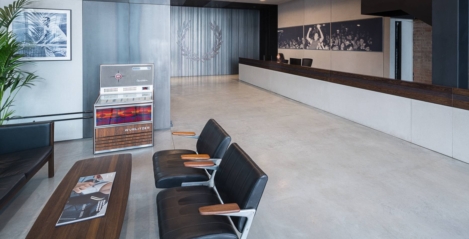April 27, 2017
Europe needs national renovation strategies for buildings, coalition claims 0
 Europe must lead the world in cutting greenhouse gas emissions from existing buildings if it is to meet the ambitions of the Paris Agreement, claims BUILD UPON, a coalition of over 300 businesses and organisations from across the continent. The coalition – which includes cities, public authorities, property developers, manufacturers and energy utilities, as well as trade associations, NGOs and universities – is backing the need for ambitious ‘national renovation strategies’ that set out clear targets, milestones and measures on transforming existing buildings. The intervention comes as EU member states near the deadline to publish updated strategies to renovate their buildings, which account for around 36 percent of Europe’s total greenhouse gas emissions, and as political decision-makers grapple over the future of EU energy laws for the construction sector.
Europe must lead the world in cutting greenhouse gas emissions from existing buildings if it is to meet the ambitions of the Paris Agreement, claims BUILD UPON, a coalition of over 300 businesses and organisations from across the continent. The coalition – which includes cities, public authorities, property developers, manufacturers and energy utilities, as well as trade associations, NGOs and universities – is backing the need for ambitious ‘national renovation strategies’ that set out clear targets, milestones and measures on transforming existing buildings. The intervention comes as EU member states near the deadline to publish updated strategies to renovate their buildings, which account for around 36 percent of Europe’s total greenhouse gas emissions, and as political decision-makers grapple over the future of EU energy laws for the construction sector.









 More than six in ten workers value happiness at work over salary and even those more motivated by salary agree that a setting that allows friendships to flourish could provide invaluable benefits for businesses, a new survey suggests. The research by Wildgoose found that 57 percent of respondents thought having a best friend in the office made their time at work more enjoyable, almost a third were more productive and over one in five said it boosted their creativity. The survey also highlighted the differences in attitudes across various groups and demographics. Women were far more likely to prioritise happiness, with eight in ten placing it above salary, compared to just 55 percent of males. The job level of an employee also played a significant role. For 85 percent of managers, salary was deemed more important, while 70 percent of entry-level, interns, and executives chose happiness.
More than six in ten workers value happiness at work over salary and even those more motivated by salary agree that a setting that allows friendships to flourish could provide invaluable benefits for businesses, a new survey suggests. The research by Wildgoose found that 57 percent of respondents thought having a best friend in the office made their time at work more enjoyable, almost a third were more productive and over one in five said it boosted their creativity. The survey also highlighted the differences in attitudes across various groups and demographics. Women were far more likely to prioritise happiness, with eight in ten placing it above salary, compared to just 55 percent of males. The job level of an employee also played a significant role. For 85 percent of managers, salary was deemed more important, while 70 percent of entry-level, interns, and executives chose happiness.


 A majority of workers (65 percent) now feel comfortable requesting to work from home, while a third (33 percent) of UK employees would decline a job offer if they weren’t able to work flexibly. This is according to a new study from Maintel which claims that today’s multi-generational workforce prefers flexible working to traditional office hours and location; with flexible work policies perceived as an important workplace benefit. Nearly three quarters (73 percent) of respondents say the company they work for has good flexible work policies in place, 64 percent of remote workers don’t feel micromanaged, and 58 percent would take the opportunity to spend even less time in an office, if it were available. Well over half (60 percent) of respondents believe technology can replace in-person interaction in the workplace. Yet there remain challenges with flexible work, including indifference regarding the security of company data (66 percent) and distractions at home (31 percent).
A majority of workers (65 percent) now feel comfortable requesting to work from home, while a third (33 percent) of UK employees would decline a job offer if they weren’t able to work flexibly. This is according to a new study from Maintel which claims that today’s multi-generational workforce prefers flexible working to traditional office hours and location; with flexible work policies perceived as an important workplace benefit. Nearly three quarters (73 percent) of respondents say the company they work for has good flexible work policies in place, 64 percent of remote workers don’t feel micromanaged, and 58 percent would take the opportunity to spend even less time in an office, if it were available. Well over half (60 percent) of respondents believe technology can replace in-person interaction in the workplace. Yet there remain challenges with flexible work, including indifference regarding the security of company data (66 percent) and distractions at home (31 percent).
 A major research study into Health and Wellbeing in offices has been launched by the British Council for Offices (BCO). “Wellness Matters: Health and Wellbeing in offices and what to do about it” is a year-long project which aims to provide definitive guidance on how to enable office Health and Wellbeing across a building’s lifecycle. The major research study has been commissioned to critique existing Health and Wellbeing measurement and certification, identify the most recent and relevant medical evidence justifying a proactive approach to Health and Wellbeing in the built environment, and give guidance on the business case for investment in this space beyond simply improving productivity. Most significantly, this research aims to deliver a practical guide to creating a healthy environment across the different stages of a building’s life cycle, from design, construction and leasing to the most important aspect by time and value: occupation and asset management.
A major research study into Health and Wellbeing in offices has been launched by the British Council for Offices (BCO). “Wellness Matters: Health and Wellbeing in offices and what to do about it” is a year-long project which aims to provide definitive guidance on how to enable office Health and Wellbeing across a building’s lifecycle. The major research study has been commissioned to critique existing Health and Wellbeing measurement and certification, identify the most recent and relevant medical evidence justifying a proactive approach to Health and Wellbeing in the built environment, and give guidance on the business case for investment in this space beyond simply improving productivity. Most significantly, this research aims to deliver a practical guide to creating a healthy environment across the different stages of a building’s life cycle, from design, construction and leasing to the most important aspect by time and value: occupation and asset management.


















